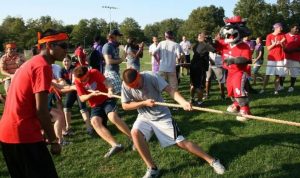Author: Richard Pountney, SIG Lead
[This post was prepared as a podcast (https://www.bera.ac.uk/the-bera-podcast-who-owns-the-curriculum-now) for the BERA Curriculum, Pedagogy and Assessment Special Interest Group]
Having recently been asked to say what had I thought has been the impact of the Covid-19 pandemic on the curriculum and the work of this special interest group, I am going to address this under three headings: the effects of the pandemic; the structures involved; and the responses being made. My overriding question is ‘Who owns the curriculum now?’
has been the impact of the Covid-19 pandemic on the curriculum and the work of this special interest group, I am going to address this under three headings: the effects of the pandemic; the structures involved; and the responses being made. My overriding question is ‘Who owns the curriculum now?’
The first of these is effects, and it is clear that there has been an interruption. But we are yet to fully understand the level of disruption. Let’s consider the main factors of this interruption – [the impression that…] schools, colleges, and universities closed since March; examinations cancelled; pupils and students sent home and asked to learn at home; and teachers and lecturers being asked to work and teach remotely. Clearly, this is not ‘business as usual’, but I have seen incredible levels of adaptation by schools and teachers to the challenge. My own university and the school trusts we work with, have worked extremely hard to respond. On a personal level, I have seen this in the schools that the children in my family attend. The hard work of teachers in this period is often not reflected, unfortunately, in media reporting of what schools have been doing – schools have not been closed and teachers have not stopped working! The effects have been on the whole community and it has required a whole school response. The role of parents, and schools’ partnerships with parents, has been crucial. Parents have had, arguably, more influence over their children’s curriculum than ever before. I would say this is more a case of parents as proxy for teachers, rather than as replacement for them – but it is a noticeable shift, perhaps, from ‘in loco parentis’ to ‘in loco magister’.
 One factor of the interruption has been teachers’ uncertainty about how long it will last and what will happen next – I know my own response started as ‘survive till Easter’ – and then became ‘manage till May’ and more lately, ‘hold on to the holidays’. I get a sense that that if we are locked down again, I will be better prepared! How about you?
One factor of the interruption has been teachers’ uncertainty about how long it will last and what will happen next – I know my own response started as ‘survive till Easter’ – and then became ‘manage till May’ and more lately, ‘hold on to the holidays’. I get a sense that that if we are locked down again, I will be better prepared! How about you?
I want to pause there, to think about structures. Schools are more than buildings – they represent a complex set of interconnected structures including, timetables, routines, and people, including parents – this is what Karl Maton calls a ‘constellation of practice’. This cosmology includes the reservoirs of physical things but also the intangibles – feelings, hopes and investments; also, our ways of doing and being are often tacit. These are our repertoires – including relationships between people, and between people and ideas. Schools are a fragile ecosystem, held together by habits of work and learning that persist because of and for the community. The curriculum is one structure that provides the ‘what’, aligned with the pedagogy of ‘how’, underpinned importantly by how we assess the ‘how well’.
In terms of pedagogy, teachers have shifted the emphasis towards remote learning, both synchronous and asynchronous. This is a shift in the dynamic – the polarity of learning and teaching. It raises the visibility of teachers own subject knowledge, and, in many cases, along with their pedagogic content knowledge – that is, the expertise to understand the sequencing and pacing of learning, as well as how learners’ misconceptions are recognised and addressed. There is no doubt in my mind that schools have provided these forms of learning and this has been impressive. Interestingly, the lockdown has become a kind of ‘opening up’ – of the curriculum and pedagogy. The open letter to ministers from the Research Libraries UK calling for a loosening of copyright laws suggests the need to rethink how we share and re-use curriculum resources, as well as strategies and techniques for teaching and learning. The difficulty, I feel, is ensuring teachers’ autonomy in curriculum making, while helping them manage the workload. This shouldn’t be too prescriptive.
The respon ses we continue to make, however, must take account of inequality heightened by the interruption. Recent studies indicate that those children most in need of school are those most likely to miss out on remote provision. Black, Asian and minority ethnic students are among those that are affected, increasing calls for an accessible and fair curriculum as a matter of social justice. In experiencing home learning, young people will want to make sense of Black Lives Matter and the calls to decolonise the curriculum and to understand the responses we, as educators, make to this. I know my own university is making huge efforts to offer extra resources and additional support to students and to pupils in our partner schools.
ses we continue to make, however, must take account of inequality heightened by the interruption. Recent studies indicate that those children most in need of school are those most likely to miss out on remote provision. Black, Asian and minority ethnic students are among those that are affected, increasing calls for an accessible and fair curriculum as a matter of social justice. In experiencing home learning, young people will want to make sense of Black Lives Matter and the calls to decolonise the curriculum and to understand the responses we, as educators, make to this. I know my own university is making huge efforts to offer extra resources and additional support to students and to pupils in our partner schools.
The announcement of the governments’ ‘catch-up premium’ and its emphasis on academic aspects of children’s return to school is important, but this needs to take account of the emotional aspects of the pandemic. Experiencing the world again as a safe space, and reaffirming connection and belonging is equally important, and sadly we may need to help pupils to acknowledge loss. Personally, I prefer the term recovery to catch-up – and it may be that we need to uncover as well as recover. Our curriculum research might throw light on what can be revealed by the drawing back of the established structures of our schools and the curriculum?
This is where we might need to hold on to our curriculum principles when they are stress-tested. Our response may be pragmatic, but it must also be informed. The pandemic will favour some ideologies over others, including those that further either a traditional or progressive idea of schooling. This is where the interruption becomes a ‘discursive gap’ – a space of possibilities. The special interest group for Curriculum, Pedagogy and Assessment can contribute to this space and to the debate. I look forward to being involved in this.
As to the question ‘who owns the curriculum now?’ – my answer for what its worth is ‘we all do!’
